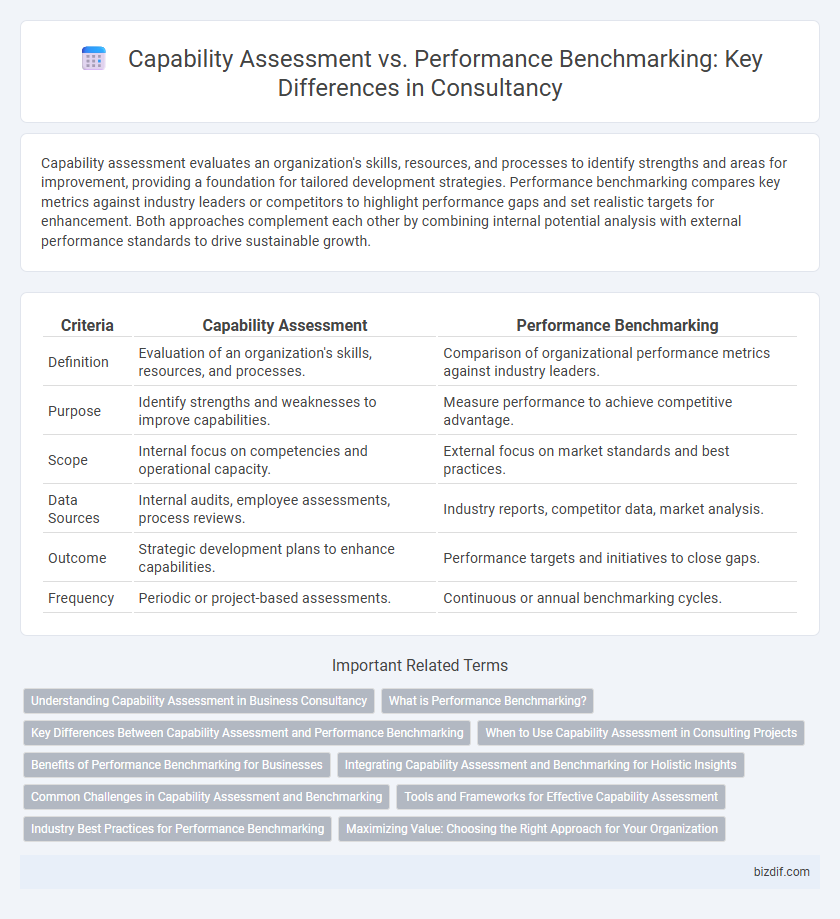Capability assessment evaluates an organization's skills, resources, and processes to identify strengths and areas for improvement, providing a foundation for tailored development strategies. Performance benchmarking compares key metrics against industry leaders or competitors to highlight performance gaps and set realistic targets for enhancement. Both approaches complement each other by combining internal potential analysis with external performance standards to drive sustainable growth.
Table of Comparison
| Criteria | Capability Assessment | Performance Benchmarking |
|---|---|---|
| Definition | Evaluation of an organization's skills, resources, and processes. | Comparison of organizational performance metrics against industry leaders. |
| Purpose | Identify strengths and weaknesses to improve capabilities. | Measure performance to achieve competitive advantage. |
| Scope | Internal focus on competencies and operational capacity. | External focus on market standards and best practices. |
| Data Sources | Internal audits, employee assessments, process reviews. | Industry reports, competitor data, market analysis. |
| Outcome | Strategic development plans to enhance capabilities. | Performance targets and initiatives to close gaps. |
| Frequency | Periodic or project-based assessments. | Continuous or annual benchmarking cycles. |
Understanding Capability Assessment in Business Consultancy
Capability Assessment in business consultancy evaluates an organization's resources, skills, and processes to identify strengths and gaps critical for achieving strategic goals. This analysis helps consultants design targeted improvement plans by measuring internal competencies against industry best practices. Unlike Performance Benchmarking, which compares external performance metrics, Capability Assessment focuses on internal potential and readiness for change.
What is Performance Benchmarking?
Performance benchmarking is a strategic process used by organizations to measure their operational efficiency and effectiveness against industry leaders or competitors. It involves comparing key performance indicators (KPIs), such as productivity, quality, and customer satisfaction, to identify gaps and areas for improvement. This method enables companies to adopt best practices and drive continuous improvement to achieve competitive advantage.
Key Differences Between Capability Assessment and Performance Benchmarking
Capability assessment evaluates an organization's skills, resources, and processes to determine its potential for achieving specific goals, focusing on internal strengths and weaknesses. Performance benchmarking compares an organization's results and metrics against industry standards or competitors to identify performance gaps and areas for improvement. The key differences lie in capability assessment's focus on potential and readiness versus benchmarking's emphasis on comparative outcomes and efficiency.
When to Use Capability Assessment in Consulting Projects
Capability assessment is essential in consulting projects when organizations need a detailed analysis of internal strengths and weaknesses to guide strategic development and resource allocation. This approach is most effective during the early stages of transformation initiatives or when entering new markets, as it identifies skill gaps and operational inefficiencies. Performance benchmarking, by contrast, is better suited for comparing results against industry standards or competitors, highlighting areas for improvement based on external performance metrics.
Benefits of Performance Benchmarking for Businesses
Performance benchmarking enables businesses to identify gaps in their operational efficiency by comparing key performance indicators against industry leaders, fostering targeted improvements. This process drives strategic decision-making through data-driven insights, enhancing competitiveness and profitability in dynamic markets. Companies leveraging performance benchmarking gain measurable outcomes such as reduced costs, optimized resource allocation, and accelerated innovation cycles.
Integrating Capability Assessment and Benchmarking for Holistic Insights
Integrating capability assessment and performance benchmarking creates a comprehensive framework that evaluates both internal competencies and external industry standards, enabling organizations to identify gaps and opportunities with precision. Capability assessment focuses on internal skills and resources, while performance benchmarking measures outcomes against competitors, providing a balanced view of strengths and weaknesses. Combining these methodologies facilitates strategic decision-making, drives continuous improvement, and enhances competitive advantage in dynamic market environments.
Common Challenges in Capability Assessment and Benchmarking
Common challenges in capability assessment and performance benchmarking include accurately defining key performance indicators (KPIs) and selecting relevant competitors or industry standards for comparison. Data quality and availability often limit the reliability of assessments, while aligning benchmarking metrics with organizational goals remains complex. Overcoming these challenges requires robust data governance, stakeholder alignment, and continuous updating of assessment frameworks.
Tools and Frameworks for Effective Capability Assessment
Capability assessment utilizes diagnostic tools and maturity models such as the Capability Maturity Model Integration (CMMI) and Balanced Scorecard to evaluate organizational competencies and identify development gaps. Performance benchmarking relies on comparative frameworks, including KPIs and industry-standard metrics, to measure operational efficiency against competitors or best practices. Both approaches leverage data analytics platforms and assessment software to provide actionable insights for strategic decision-making and continuous improvement.
Industry Best Practices for Performance Benchmarking
Capability Assessment evaluates an organization's internal skills and resources to identify strengths and development areas, providing a foundation for strategic improvement. Performance Benchmarking compares these capabilities against industry best practices and top competitors to highlight performance gaps and opportunities for operational excellence. Leveraging industry benchmarks ensures alignment with market leaders, driving superior productivity, innovation, and competitive advantage in consultancy outcomes.
Maximizing Value: Choosing the Right Approach for Your Organization
Capability assessment identifies organizational strengths and weaknesses by evaluating skills, processes, and resources to inform targeted development plans. Performance benchmarking compares key metrics against industry leaders, revealing gaps and best practices for competitive advantage. Selecting the right approach depends on whether your goal is internal improvement or external competitiveness, ensuring maximum value from consultancy efforts.
Capability Assessment vs Performance Benchmarking Infographic

 bizdif.com
bizdif.com